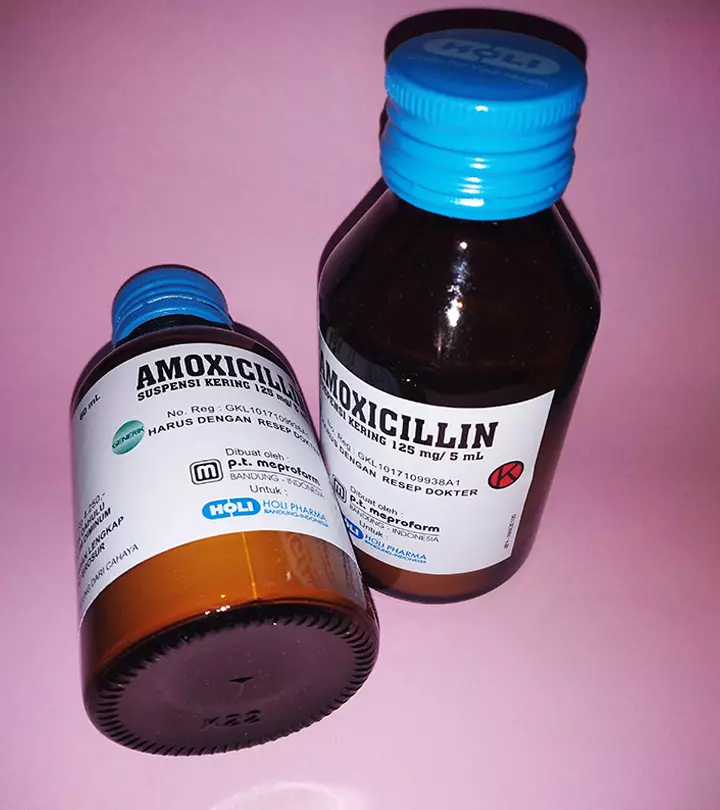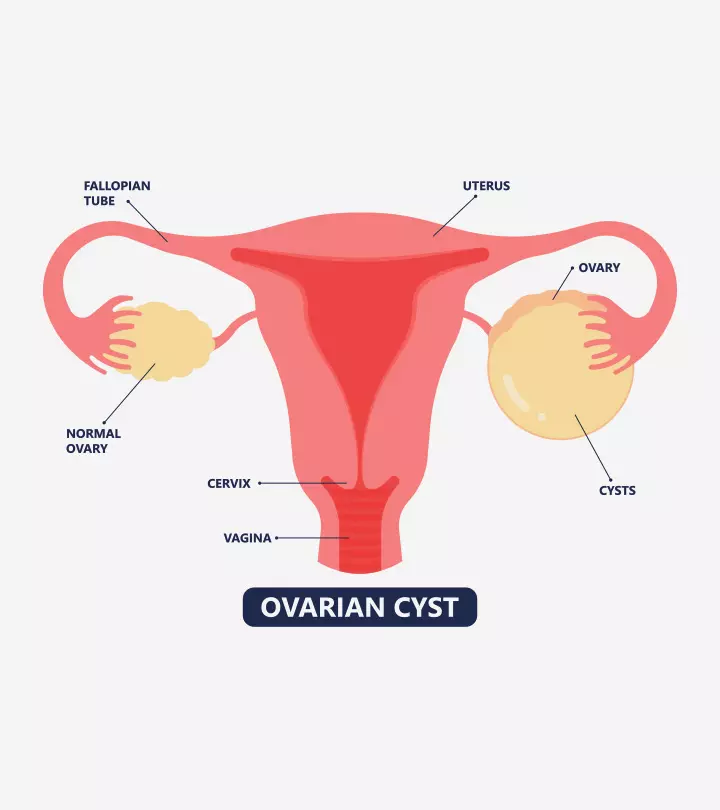
Image: iStock
Lexapro is the brand name for the generic drug Escitalopram. It belongs to the category of selective serotonin reuptake inhibitor (SSRI) antidepressant drugs. It is used for treating major depressive disorder (MDD) and generalized anxiety disorder (GAD) (1). Many women, especially those who have the drug already, may wonder about its safety during pregnancy.
This post answers whether you can take Lexapro while pregnant, its safe use, risks, and side effects.
Key Pointers
- Lexapro is an antidepressant drug whose safety is not well-known in pregnant women.
- Some studies have shown that taking selective serotonin reuptake inhibitors (SSRIs) such as Lexapro during pregnancy might increase the risk of miscarriage and heart defects in babies.
- The side effects of Lexapro include diarrhea, constipation, heartburn, abdominal pain, and dizziness.
- You must use this drug only on the doctor’s recommendation, who will consider the safety, benefits, and risk elements to suggest the best dosage.
Can You Take Lexapro When Pregnant?

Image: Shutterstock
The US Food and Drug Administration (FDA) had listed Escitalopram under pregnancy category C. This means that fetal toxicity was shown in animal reproduction studies, while there are no adequate and well-controlled studies in pregnant women. Therefore, Escitalopram might be prescribed during pregnancy only when its benefits outweigh the fetal and maternal risks (1).
How Does Lexapro Work?
Lexapro or Escitalopram acts by increasing the activity of serotonin, a naturally available chemical in the body. Serotonin modulates several human behavioral processes and responses such as mood, perception, memory, anger, aggression, fear, stress, addiction, and sexual interests. Lexapro produces antidepressant activity by working on some parts of the central nervous system. The drug may also affect other body systems, leading to concerns about its use for maternal health (2).
Jenni, a mother who struggles with anxiety, shares her experience of using Lexapro during pregnancy. She says, “My first indication of anxiety showed up ten years ago in the 2nd trimester of my first pregnancy. They diagnosed me with OCD/ Anxiety disorder. I thought OCD was just a title for super clean people or people who turned lights on and off multiple times, but it turned out I had the “What If” kind of OCD where I continuously would create “What If” scenarios in my head all day long and worry about them to the point that I couldn’t function during the day or function at work.
“I went to my doctor. I cried the whole time and scored a 9 out of 10 on their anxiety quiz. I was put on Lexapro. That was three months ago. For the first time in ten years, I felt like myself again. There wasn’t this worry in the pit of my stomach. This constant worry is eating away at me. My brain could fully function. I felt NORMAL. NORMAL was good. NORMAL was great. NORMAL felt peaceful (i).”
What Are The Potential Risks Of Taking Lexapro During Pregnancy?
The limited research on Escitalopram use during pregnancy suggests that the drug may not increase the risk of birth defects or congenital malformationsi Structures or functions that develop abnormally during fetal life but may slightly affect fetal development and increase the risk of low birth weight of the fetus (3). Other scientific studies suggest certain risks with taking antidepressants, including SSRIs such as Lexapro, during pregnancy.
- A 2016 study revealed that using antidepressants in pregnancy, particularly during the first trimester, was linked to a higher risk of miscarriage (4).

Image: Shutterstock
- A review published in 2019 stated that exposure to antidepressants, such as SSRIs, in the third trimester of pregnancy may be associated with seizures in newborns (5).
- An increased risk of severe congenital heart defects (CHD) may be associated with SSRI exposure in early pregnancy (6). Newborns whose mothers took these medications late in the third trimester were found to develop some complications. Conditions indicated serotonin toxicity symptoms or drug discontinuation symptoms such as seizures, respiratory distress, temperature fluctuations, vomiting, hypoglycemiaiA condition where your blood sugar level falls below the normal range , tremor, irritability, and constant crying (1).
- Some studies indicate a higher rate of persistent pulmonary hypertensioniA condition when the blood pressure in the arteries connecting the heart and the lungs is excessively high of the newborn (PPHN) whose mothers took SSRI medication after 20 weeks of pregnancy (7). PPHN occurs when a baby’s lungs cannot function outside the uterus.
Experts have found that the increase in the risk of miscarriages was similar in women who were exposed to SSRIs during early pregnancy and those who discontinued SSRIs before pregnancy (8). Nevertheless, more rigorous human studies are required to confirm all findings (9).
 Point to consider
Point to considerWhat Are The Side Effects Of Lexapro?

Image: Shutterstock
Lexapro or Escitalopram may cause the following side effects (10).
- Nausea
- Diarrhea
- Constipation
- Altered sex drive
- Drowsiness
- Abdominal pain
- Heartburn
- Increased sweating
- Fatigue
- Flu-like symptoms, runny nose, or sneezing
Some serious adverse effects that may require immediate medical attention are:
- Hyper excitement
- Hallucination (seeing or hearing things that do not exist)
- Allergic reactions such as hives, rash, itching, or swelling of face, throat, tongue, lips, or eyes
- Fever
- Joint pain
- Symptoms of serotonin syndromeiA life-threatening condition caused by medications that build up excess serotonin in the body such as fever, sweating, confusion, irregular heartbeat, muscle stiffness or twitching, agitation, hallucinations, loss of coordination, nausea, vomiting, or diarrhea
- Problem concentrating or with memory
- SeizuresiA sudden and temporary electrical disturbance in the brain, leading to changes in behavior, feelings, or movements
Discontinuing Lexapro suddenly may precipitate withdrawal symptoms such as:

Image: Shutterstock
- Mood alterations
- Irritability
- Agitation
- Tingling in hands and feet
- Anxiety
- Dizziness
- Confusion
- Headache
- Sleep problems
 Caution
CautionWhat Should You Remember When Using Lexapro?
Pregnancy may change the way some medications act inside your body. However, you must not stop Lexapro administration abruptly on conception or detection of pregnancy. It may lead to withdrawal symptoms and exacerbation of depression. Untreated depression during pregnancy may have complications, such as an increased risk of developing suicidal tendencies and postpartum depression (11). Therefore, discuss the use of Lexapro extensively with your doctor, understand its side effects, and use it only as prescribed.
Frequently Asked Questions
1. Can Lexapro affect pregnancy test results?
An isolated case study reports amenorrhea (absence of menstruation) and a false-positive urine pregnancy test in a woman on Escitalopram. However, there are no such reports from large studies (12).
2. Can Lexapro during pregnancy cause autism?
Recent studies have demonstrated no causal association between prenatal exposure to SSRIs and autism spectrum disorder (ASD). Some clinical studies have shown an association between the use of SSRIs in pregnant women and ASD in the offspring. However, a limitation of these studies was that they could not distinguish between the effects of drug exposure and the consequences of the underlying maternal psychiatric illness (parental psychiatric disorder in itself is associated with an increased risk of ASD in the baby) (13).
3. Does Lexapro affect female fertility?
A 2022 study aimed to review the effects of selective serotonin reuptake inhibitorsiA type of antidepressant that usually has fewer side effects on male and female fertility. The study suggested that escitalopram (Lexapro) may adversely affect the fertility of females (14).
4. Do newborns experience Lexapro withdrawal?
Taking escitalopram (Lexapro) in late pregnancy may cause temporary neonatal withdrawal syndrome in babies. Your baby may appear fussy and irritable. They may also have altered sleeping patterns, difficult breathing, and increased muscle tone. However, these symptoms disappear in a few weeks without treatment (15).

Image: Shutterstock
The American Congress of Obstetricians and Gynecologists (ACOG) states that 14 to 23 percent of pregnant women may experience symptoms of depression (16). It is important to seek help from support groups, private psychotherapists, or psychiatrists. Your physician may prescribe Lexapro or Escitalopram after closely examining its risks and benefits. Feel free to discuss what is best for you and your child with your prenatal care provider and mental health provider.
Infographic: What Happens When You Suddenly Stop Taking Lexapro?
The antidepressant drug, Lexapro, modulates the Serotonin levels in the body, and an abrupt stoppage may disturb the neurotransmitter balance. It can cause withdrawal symptoms if someone regularly takes Lexapro and suddenly stops having it. Go through the infographic below to know such withdrawal symptoms.

Illustration: Momjunction Design Team
If you’re pregnant and feeling depressed, watch this video to learn about the safest antidepressant options. Increase your awareness and make informed choices about your mental health while pregnant.
Personal Experience: Source
MomJunction articles include first-hand experiences to provide you with better insights through real-life narratives. Here are the sources of personal accounts referenced in this article.
i. The struggle is real.https://faithfamilyfarmingblog.wordpress.com/2018/01/06/the-struggle-is-real/
References
- Lexapro®.
https://www.accessdata.fda.gov/drugsatfda_docs/label/2017/021323s047lbl.pdf - Kristen Landy et al.; (2021); Escitalopram.
https://www.ncbi.nlm.nih.gov/books/NBK557734/ - ChagitKlieger-Grossmann et al.; (2012); Pregnancy outcomes following use of escitalopram: a prospective comparative cohort study.
https://pubmed.ncbi.nlm.nih.gov/22075232/ - Nisha D Almeida et al.; (2016); Risk of Miscarriage in Women Receiving Antidepressants in Early Pregnancy Correcting for Induced Abortions.
https://pubmed.ncbi.nlm.nih.gov/27031036/ - Faruk Uguz; (2019); The Use of Antidepressant Medications During Pregnancy and the Risk of Neonatal Seizures: A Systematic Review.
https://pubmed.ncbi.nlm.nih.gov/31425466/ - Tanja Majbrit Knudsen et al.; (2014); Increased risk of severe congenital heart defects in offspring exposed to selective serotonin-reuptake inhibitors in early pregnancy – an epidemiological study using validated EUROCAT data.
https://bmcpregnancychildbirth.biomedcentral.com/articles/10.1186/1471-2393-14-333 - Escitalopram.
https://www.medicinesinpregnancy.org/medicine–pregnancy/escitalopram/ - Andersen Jon Traerup et al.; (2014); Exposure to Selective Serotonin Reuptake Inhibitors in Early Pregnancy and the Risk of Miscarriage.
https://journals.lww.com/greenjournal/Abstract/2014/10000/Exposure_to_Selective_Serotonin_Reuptake.2.aspx - Escitalopram.
https://www.nhs.uk/medicines/escitalopram/ - Escitalopram.
https://medlineplus.gov/druginfo/meds/a603005.html - Justin Chan et al.; (2014); Risks of untreated depression in pregnancy.
https://www.ncbi.nlm.nih.gov/pmc/articles/PMC3952758/ - Daniel R. Morales et al.; (); Antidepressant use during pregnancy and risk of autism spectrum disorder and attention deficit hyperactivity disorder: systematic review of observational studies and methodological considerations.
https://www.ncbi.nlm.nih.gov/pmc/articles/PMC5767968/ - No Increased Risk of Autism in Children Prenatally Exposed to Commonly Used Antidepressants.
https://womensmentalhealth.org/posts/no-increased-risk-autism-antidepressants/ - Jovana Z Milosavljević et al.; (2022); The effects of selective serotonin reuptake inhibitors on male and female fertility: a brief literature review.
https://pubmed.ncbi.nlm.nih.gov/33480810/#:~:text=The%20results%20of%20certain%20experimentalthe%20fertility%20of%20female%20patients. - Citalopram | Escitalopram (Celexa® | Lexapro®).
https://mothertobaby.org/fact-sheets/citalopramescitalopram-celexalexapro-pregnancy/ - Depression during pregnancy.
https://americanpregnancy.org/healthy-pregnancy/pregnancy-health-wellness/depression-during-pregnancy-2/ - Escitalopram.
https://www.medicinesinpregnancy.org/medicine–pregnancy/escitalopram/ - Pregnancy breastfeeding and fertility while taking escitalopram.
https://mothertobaby.org/fact-sheets/citalopramescitalopram-celexalexapro-pregnancy/
Community Experiences
Join the conversation and become a part of our nurturing community! Share your stories, experiences, and insights to connect with fellow parents.
Read full bio of Dr. Pamela Adhiambo Muga
Read full bio of Dr. Joyani Das
Read full bio of Rebecca Malachi
Read full bio of Reshmi Das

















